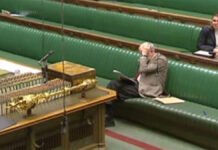
This goes beyond Party politics, it’s about the ‘National interest’ and that interest is full sovereignty.
EU leaders have been handed an ultimatum: accept the treaty breach or prepare for a messy divorce. The UK signed the withdrawal treaty and formally left the EU in January, and will be leaving the single market when the status quo agreement expires at the end of this year.
However, the clock is ticking towards October 15, A deadline set by Boris Johnson who has talked tough ahead of a crucial round of post-Brexit trade talks with the European Union, saying Britain could walk away from the talks within weeks while insisting that a no-deal exit would be a “good outcome for the UK”.
With talks deadlocked, Johnson said an agreement would only be possible if EU negotiators are prepared to “rethink their current positions”.
The EU, in turn, accuses Britain of failing to negotiate seriously.
Talks on a trade deal have been stuck over state aid rules and fishing. Without an agreement, nearly $1 trillion in trade between the EU and the UK could be thrown into confusion at the beginning of 2021, compounding the economic impact of the coronavirus pandemic.
The latest dispute centres on rules for Northern Ireland, which shares a land border with EU member Ireland. Under the 1998 agreement, there must be no hard border in Ireland.
To ensure that, the British-EU divorce pact calls for Northern Ireland to continue to apply some EU rules. But the UK’s new bill unveiled this week would assert the power to override many of those EU rules, acknowledging that London would be violating international law by doing so.
Starmer’s position is apathetic
Sir Keir Starmer’s revised position on Brexit, unequivocally shows his main objections about the UK’s exit from the EU was not a principled stance but rather a vehicle to crash the Labour Party, completing the coup he participated in back in 2016 to remove Jeremy Corbyn, thus safeguarding the establishment and the status quo, Starmer is no longer forensically scrutinising legislation’s or bills, his recent interview makes it quite clear he is impartial his new mantra ‘deal or no deal’ we need to move on.
Making a statement on the bill Starmer who campaigned for a second Brexit referendum and once called out in the loudest of siren voices giving warnings a ‘no-deal Brexit’ – stated apathetically that the “way forward” now was to get a trade deal, adding “if you fail to get a deal, prime minister, you own that failure”.
“The outstanding issues are not difficult. They can be resolved. So what I say to the prime minister is, you promised a good deal, get on, negotiate it,” he added.
“That’s what’s in the national interest and focus then on the issue in hand which is tackling this pandemic.”
Leaving the European Union is the necessary goal of the Left in Britain. We should never have allowed the Tories to lead the way.
The Labour Peer Baron Glasman writes: The European Union is the greatest capitalist project ever devised by the human mind. It guarantees, in treaty form, the free movement of capital, labor, goods, and services throughout its territory as a constitutional right. These are known as the “Four Freedoms.” Imagine NAFTA underpinned by a political union so that it would be illegal to resist capitalism. A union in which economic policy is decided not democratically—but by judges interpreting whether the policy is “treaty compliant.” Yet that is the institution supported by the vast majority of progressives throughout the continent—and the main cause of the palsy that has overtaken social democrats across Europe. They think political and economic liberalism as the legal form of globalization is the best you can hope for. That is the European Union.
Whenever the left cannot make the distinction between globalization and internationalism, or democracy and populism, it loses working-class support in an orgy of legalistic self-righteousness. Give up on the democratic resistance to the domination of capital, and the meaning of socialism becomes obscure to a lot of people. The stakes are high in the Brexit impasse precisely because the working class has not been cowed by academic disapproval, editorial condemnation, or managerial contempt. The “basket of deplorables” have not given up on the idea that a democratic, self-governing nation is a better bet than the European Court of Justice. They are not changing their minds.
There is no Left or Right.
“Britain’s continuing membership of the Community would mean the end of Britain as a completely self-governing nation and the end of our democratically elected parliament as the supreme law-making body in the United Kingdom.”-Tony Benn
While ever the EU have any authority over the UK via trade goods or laws we are not a self-governing nation and self-Determantion is a socialist principle.
What’s true is it all boils down to what’s best for the UK and in our national interest.
For many that comes in the shape of the new United Kingdom Internal Market Bill. If the withdrawal agreement was more like a surrender act then the new Internal Market Bill is a safeguard that ensures UK laws cannot be trumped by EU rules & regulations.
The United Kingdom Internal Market Bill is more like a sovereignty bill, an opt-out from any common rule book that hampers UK competition.
It is been presented as a new Bill to protect jobs and trade across the whole of the United Kingdom after the Transition Period ends.
The UK Internal Market Bill claims it will guarantee companies can trade unhindered in every part of the UK as they have done for centuries, ensuring the continued prosperity of people and business across four parts of the UK, while maintaining our world-leading high standards for consumers, workers, food, animal welfare and the environment.
The Bill will also enable the UK Government to provide financial assistance to Scotland, Wales, and Northern Ireland with new powers to spend taxpayers’ money previously administered by the EU. From January 2021, the UK will be able to invest in communities and businesses nationwide with powers covering infrastructure, economic development, culture, sport, and support for educational, training and exchange opportunities both within the UK and internationally – much of which were previously done at an EU level.
The transfer of powers from the EU to the UK Government will complement and strengthen existing support given to citizens in Scotland, Wales, and Northern Ireland by the devolved administrations, without taking away their responsibilities. A strong UK Internal Market, with the ability of the UK Government to invest to support all parts of our Union, will help the UK Government to deliver prosperity for businesses and communities across all parts of the UK, levelling up the country and strengthening the Union.
The proposals will allow the UK Government to meet its commitments to deliver replacements for EU programmes, such as a UK Shared Prosperity Fund, replacing bureaucratic EU structural funds and at a minimum match the size of those funds in each nation.
The new UK Internal Market Bill that could affect post-Brexit customs and trade rules in Northern Ireland.
The Bill will also set out limited and reasonable steps to ensure that the government is always able to deliver on its commitments to the people of Northern Ireland. The UK Government remains fully committed to implementing the Withdrawal Agreement and Northern Ireland Protocol.
Remit of the bill is to take away EU interference
The new bill sets out rules for the operation of the UK internal market – trade between England, Scotland, Wales and Northern Ireland – after the end of the Brexit transition period in January.
It proposes:
- No new checks on goods moving from Northern Ireland to the rest of Great Britain
- Giving UK ministers powers to modify or “disapply” rules relating to the movement of goods that will come into force from 1 January if the UK and EU are unable to reach an alternative agreement through a trade deal
- Powers to override previously agreed obligations on state aid – government support for businesses
The bill explicitly states that these powers should apply even if they are incompatible with international law.
Ministers say the legislation is needed to prevent “damaging” tariffs on goods travelling from the rest of the UK to Northern Ireland if negotiations with the EU on a free trade agreement fail.
Commission President Ursula von der Leyen tweeted: “Very concerned about announcements from the British government on its intentions to breach the Withdrawal Agreement. This would break international law and undermines trust.”
Very concerned about announcements from the British government on its intentions to breach the Withdrawal Agreement. This would break international law and undermines trust. Pacta sunt servanda = the foundation of prosperous future relations.
— Ursula von der Leyen (@vonderleyen) September 9, 2020
Downing Street said the EU Withdrawal Agreement – repeatedly described as “oven ready” by Mr Johnson during last year’s general election – contained “ambiguities” and lacked clarity in “key areas”.
As the UK pushes ahead with its plan to ensure sovereignty the Eu claim the British government are acting outside international law by breaching the divorce treaty, the EU negotiators are trying to gauge how to deal with London.
European Commission Vice President Maros Sefcovic expressed concern about the plan before a meeting with British counterpart Michael Gove in London, taking place alongside trade talks between chief negotiators Michel Barnier and David Frost.
EU diplomats and officials said the bloc could use the Withdrawal Agreement to take legal action against the UK, though there would be no resolution before the end-of-year deadline for Britain’s full exit.
One EU source said the UK would not succeed if it aims to try to use the planned breach of the Withdrawal Agreement as a threat to extract concessions from the bloc in trade talks.
“If they try to do that, it will fail,” the EU source said on condition of anonymity.
A note distributed by the EU executive to the 27 EU member states said the Withdrawal Agreement gives the bloc up to four years to launch a legal procedure against the UK if it violates EU rules during a transition period this year.
Former Prime ministers and harden Remainers Theresa May and John Major scolded Johnson for considering an explicit, intentional breach of international law.
“If we lose our reputation for honouring the promises we make, we will have lost something beyond price that may never be regained,” Major said.
Most people would suggest that price was the sovereignty John Major handed over to the EU in the first place after he pushed the Maastricht treaty through parliament without a referendum. Has Jeremy Corbyn who opposed our entry to the EU and the ratification of the Maastricht Treaty in 1993, saying: “… the whole basis of the Maastricht treaty is the establishment of a European central bank which is staffed by bankers, independent of national Governments and national economic policies, and whose sole policy is the maintenance of price stability. That will undermine any social objective that any Labour Government in the United Kingdom—or any other Government—would wish to carry out. … The Maastricht treaty does not take us in the direction of the checks and balances contained in the American federal constitution. It takes us in the opposite direction of an unelected legislative body—the [European] Commission—and, in the case of foreign policy, a policy Commission that will be, in effect, imposing foreign policy on nation states that have fought for their own democratic accountability”
European diplomats said the UK was playing a game of Brexit “chicken”, threatening to wreck the process and challenging Brussels to change course. Some fear Johnson may view a no-deal exit as a useful distraction from the pandemic.
However,most people will see that the UK must ensure the EU cannot impose authority over the UK after the transition period making this bill an essential piece of legislation in UK sovereignty
Help Us Sustain Ad-Free Journalism
Sorry, I Need To Put Out the Begging Bowl
Independent Journalism Needs You
Our unwavering dedication is to provide you with unbiased news, diverse perspectives, and insightful opinions. We're on a mission to ensure that those in positions of power are held accountable for their actions, but we can't do it alone. Labour Heartlands is primarily funded by me, Paul Knaggs, and by the generous contributions of readers like you. Your donations keep us going and help us uphold the principles of independent journalism. Join us in our quest for truth, transparency, and accountability – donate today and be a part of our mission!
Like everyone else, we're facing challenges, and we need your help to stay online and continue providing crucial journalism. Every contribution, no matter how small, goes a long way in helping us thrive. By becoming one of our donors, you become a vital part of our mission to uncover the truth and uphold the values of democracy.
While we maintain our independence from political affiliations, we stand united against corruption, injustice, and the erosion of free speech, truth, and democracy. We believe in the power of accurate information in a democracy, and we consider facts non-negotiable.
Your support, no matter the amount, can make a significant impact. Together, we can make a difference and continue our journey toward a more informed and just society.
Thank you for supporting Labour Heartlands











